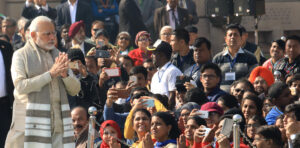July 2017, Volume 28, Issue 3
Central Asia’s Globalized Despots
A review of Dictators Without Borders: Power and Money in Central Asia by Alexander Cooley and John Heathershaw.
625 Results
July 2017, Volume 28, Issue 3
A review of Dictators Without Borders: Power and Money in Central Asia by Alexander Cooley and John Heathershaw.
April 2015, Volume 26, Issue 2
A review of Power Politics in Zimbabwe by Michael Bratton.


October 2019, Volume 30, Issue 4
Despite the lack of electoral turnover in ANC-ruled South Africa, the country’s successful resistance to efforts at “state capture” under former president Jacob Zuma testifies to the vitality of its democracy.

January 2019, Volume 30, Issue 1
Not so long ago, the internet was being lauded as a force for greater freedom and democracy. With the rise of intrusive and addictive social media, however, a discomfiting reality has set in.


April 2024, Volume 35, Issue 2
The problem for democracy today is not capitalism; it is a decline in public honesty and civility. But there is an opportunity to revive our sense of national community, if we seize it.
April 2009, Volume 20, Issue 2
Reports on elections in Bangladesh, El Salvador, and Ghana.
October 2005, Volume 16, Issue 4
Reports on elections in Afghanistan, Albania, Bulgaria, Burundi, Egypt, Ethiopia, Guinea-Bissau, Iran, Kyrgyzstan, Lebanon, Mauritius, Poland, and Suriname.
January 2019, Volume 30, Issue 1
Excerpts from: the G7 Charlevoix Commitment on Defending Democracy from Foreign Threats; victory speech by Brazilian president Jair Bolsonaro; inaugural address by Mexican president Andrés Manuel López Obrador; inaugural address by Maldivian president Ibrahim Mohamed Solih; remarks by Angolan journalist Rafael Marques; and address by former U.S. Secretary of State Madeleine Albright commemorating the 100th anniversary of the Washington Declaration.
October 2001, Volume 12, Issue 4
Reports on elections in Albania, Belarus, Bulgaria, East Timor, Fiji, São Tomé and Principe, Seychelles, and Uganda.
April 1999, Volume 10, Issue 2
Reports on elections in the Central African Republic, El Salvador, Estonia, Grenada, Guinea, Kazakhstan, and Nigeria.
Spring 1991, Volume 2, Issue 2
Reports on elections in Bangladesh, Barbados, Benin, Cape Verde, El Salvador, Guatemala, Haiti, São Tomé & Príncipe, and Yugoslavia.
July 2021, Volume 32, Issue 3
Reports on elections in Algeria, Benin, Cape Verde, Chad, Congo-Brazzaville, Djibouti, Mongolia.
April 1997, Volume 8, Issue 2
Reports on elections in Chad, Gabon, Gambia, Madagascar, Pakistan, Russia (Chechen Republic), Singapore.


January 2022, Volume 33, Issue 1
President Kais Saied’s power grab has crushed Tunisian democracy, returning the country to the old playbook of Arab dictators past and present.


April 2023, Volume 34, Issue 2
Vladimir Putin’s reputation as a skillful leader was buoyed by years of economic good fortune. But when his regime faltered, his rule quickly descended into the fearful, repressive, and paranoid state we see today.


July 2022, Volume 33, Issue 3
The Kremlin wields food as a weapon and a shield against Western interference. But Putin’s push for food autarky could backfire, driving up prices and turning Russians against the regime.

April 2019, Volume 30, Issue 2
Xi reads Tiananmen as a cautionary tale, and he has sought to centralize power and reverse years of ideological atrophy. By controlling the past, he is trying to determine how the Chinese will view their present and future.


April 2021, Volume 32, Issue 2
China’s fast economic rise has not dented its dictatorship, but Xi Jinping’s neo-Stalinist strategy has unleashed new challenges and tensions for the Communist Party’s long-term prospects for survival.


January 2021, Volume 32, Issue 1
India’s Constitution has long seemed stable, but the rise of an ethnic, absolute, and opaque state is changing the constitutional order in momentous and disturbing ways.


July 2019, Volume 30, Issue 3
Why do ordinary people vote to return to office undemocratic incumbents? New survey experiments in several countries suggest that many voters are willing to put their partisan interests above democratic principles—a finding that may be key to understanding democratic backsliding.